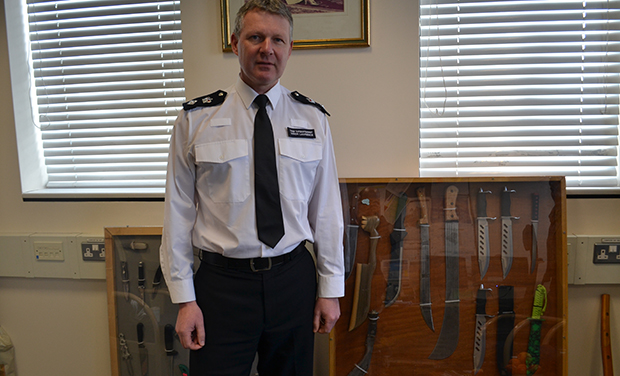Yet another stabbing in Hackney – but police do not believe recent incidents of knife attacks are related

Hackney’s borough commander in his office at Stoke Newington Police Station – with a cabinet of knives taken off the streets by police
Hackney’s borough commander has said a spate of recent stabbings do not appear to be related – and he has admitted it is has become harder for police to gather intelligence locally since restructuring changes brought about by cuts were introduced to the Metropolitan Police.
Detective Chief Superintendent Simon Laurence made his remarks in an interview with the Hackney Citizen after police launched a fresh operation to tackle knife crime following a spate of stabbings.
There were weapons sweeps by police and council workers in Hackney and elsewhere last week.
In the past two months there have been numerous incidents in which young men were found in the Homerton, Stoke Newington and Dalston areas suffering from knife wounds.
On Friday a man in his 30s was found stabbed in Stoke Newington Road at the junction with Somerford Grove.
It is thought he was the seventh person to be knifed in Hackney this month alone. In London overall, knife crime is on the rise.
Speaking on Friday afternoon in his office at Stoke Newington Police Station next to cabinets full of knives taken off the streets by police, Chief Superintendent Laurence said: “I’m concerned about any knife crime. Nobody deserves to be stabbed. However, although it’s a rise in the last three or for weeks, in the rolling 12 months, it’s not.
“One of the things I talk about regularly is that it isn’t just the police’s role to take knives off the street. It’s [the role of] parents, teachers, carers – and we are the end of the line. But we will carry out our role and we will do stop and search.”
He said: “Can we link these [the recent stabbings] in any way and is it gang related? From what we see, and from all the research we’ve done, they don’t seem to be linked.”
And he added: “There’s been a rise in violence, most definitely since Christmas, but are these incidents related? I don’t think so.”
Since mid-December, only two of the many stabbings in Hackney have been classed by police as gang related.
Asked whether deep cuts to policing had impacted on the ability of officers locally to get and analyse good quality intelligence, Chief Superintendent Laurence said this function had been centralised – making it further removed from the boroughs.
He said: “The intelligence under the local policing model rolled out in 2012-13, the way intelligence is delivered to the Met, has changed. Each borough used to have its own borough intelligence unit. Now it is run centrally and delivered locally.
“So for officers on a borough, they are not able to task into or ask for an intelligence product as easily as they used to. I would say, yes, it is more difficult.”
He said if there were “less staff there [in Scotland Yard]” and a request from a borough did “not fit the control priorities and the properties of the Met”, it may be acted on more slowly or not at all.
“So if I now wanted a product – say, for example, there was a series of robberies and we thought it was a similar method or the same person – previously we would have tasked an analyst locally to do that.
“Now you have to do that through a bit more of a convoluted way, and you may get that product eventually…or you may not.”
Legislative changes meant there were now tougher penalties for those caught carrying a knife twice, he added – and he said police would always attend a call reporting someone carrying a blade.
“If you are caught for the second time and you’re over 18, the expected sentence is six months, and if you’re 16 and 17 and are caught for the second time, the expected sentence is four months,” he added.
As part of Operation Sceptre – the Met’s response to habitual knife carriers – the force is asking people with information about anyone carrying or using knives to contact your local police via 101 or call Crimestoppers anonymously on 0800 555 111.
